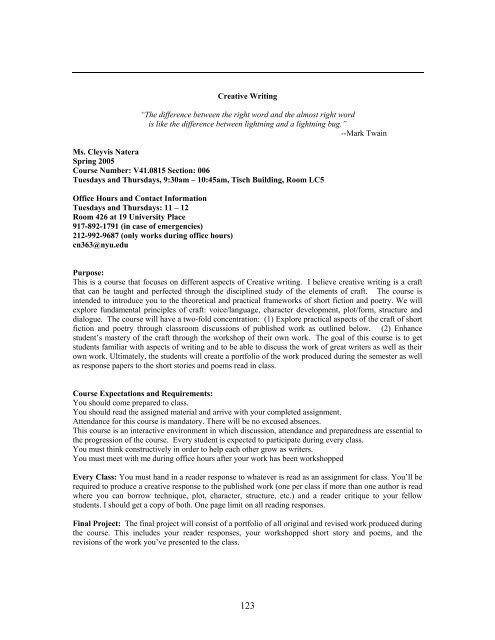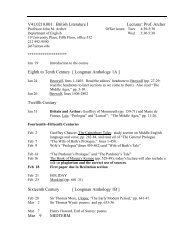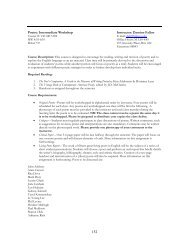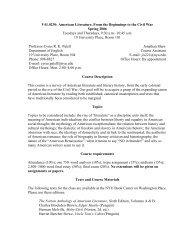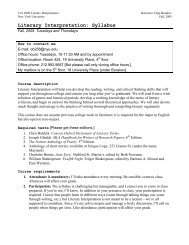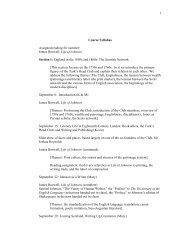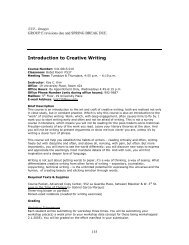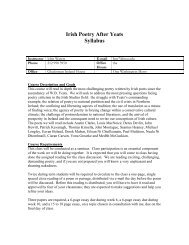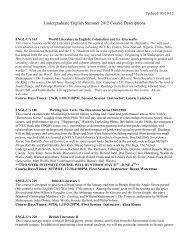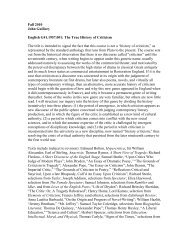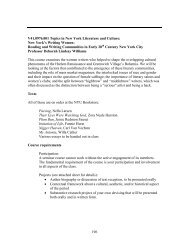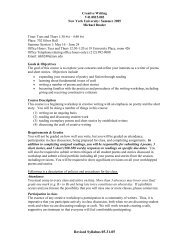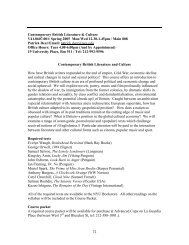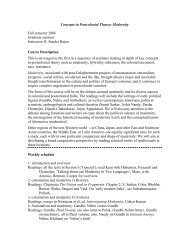Creative Writing - Department of English | New York University
Creative Writing - Department of English | New York University
Creative Writing - Department of English | New York University
You also want an ePaper? Increase the reach of your titles
YUMPU automatically turns print PDFs into web optimized ePapers that Google loves.
<strong>Creative</strong> <strong>Writing</strong>“The difference between the right word and the almost right wordis like the difference between lightning and a lightning bug.”--Mark TwainMs. Cleyvis NateraSpring 2005Course Number: V41.0815 Section: 006Tuesdays and Thursdays, 9:30am – 10:45am, Tisch Building, Room LC5Office Hours and Contact InformationTuesdays and Thursdays: 11 – 12Room 426 at 19 <strong>University</strong> Place917-892-1791 (in case <strong>of</strong> emergencies)212-992-9687 (only works during <strong>of</strong>fice hours)cn363@nyu.eduPurpose:This is a course that focuses on different aspects <strong>of</strong> <strong>Creative</strong> writing. I believe creative writing is a craftthat can be taught and perfected through the disciplined study <strong>of</strong> the elements <strong>of</strong> craft. The course isintended to introduce you to the theoretical and practical frameworks <strong>of</strong> short fiction and poetry. We willexplore fundamental principles <strong>of</strong> craft: voice/language, character development, plot/form, structure anddialogue. The course will have a two-fold concentration: (1) Explore practical aspects <strong>of</strong> the craft <strong>of</strong> shortfiction and poetry through classroom discussions <strong>of</strong> published work as outlined below. (2) Enhancestudent’s mastery <strong>of</strong> the craft through the workshop <strong>of</strong> their own work. The goal <strong>of</strong> this course is to getstudents familiar with aspects <strong>of</strong> writing and to be able to discuss the work <strong>of</strong> great writers as well as theirown work. Ultimately, the students will create a portfolio <strong>of</strong> the work produced during the semester as wellas response papers to the short stories and poems read in class.Course Expectations and Requirements:You should come prepared to class.You should read the assigned material and arrive with your completed assignment.Attendance for this course is mandatory. There will be no excused absences.This course is an interactive environment in which discussion, attendance and preparedness are essential tothe progression <strong>of</strong> the course. Every student is expected to participate during every class.You must think constructively in order to help each other grow as writers.You must meet with me during <strong>of</strong>fice hours after your work has been workshoppedEvery Class: You must hand in a reader response to whatever is read as an assignment for class. You’ll berequired to produce a creative response to the published work (one per class if more than one author is readwhere you can borrow technique, plot, character, structure, etc.) and a reader critique to your fellowstudents. I should get a copy <strong>of</strong> both. One page limit on all reading responses.Final Project: The final project will consist <strong>of</strong> a portfolio <strong>of</strong> all original and revised work produced duringthe course. This includes your reader responses, your workshopped short story and poems, and therevisions <strong>of</strong> the work you’ve presented to the class.123
Student Presentations: The last 6 sections <strong>of</strong> the class will be open for you to bring in your favoritepublished short stories, poems or sections <strong>of</strong> novels/novellas and present them to the class. You must pairup with a class mate to complete the class presentations. Students cannot present on stories/poems alreadydiscussed in class. However, you can present on authors <strong>of</strong>f the syllabus. There will be two presentationsper class lasting 25 minutes each. It is important that you stick to the allotted time. Students not presentingduring the course will be expected to hand in the responses to the readings. The length <strong>of</strong> the stories/poemswill be left to your discretion.Workshop Component: Each student will be required to hand in creative work during each phase <strong>of</strong> theclass. During the short fiction section each student must hand in a short story (8-10 double space pages) andduring the poetry section the student must hand in a minimum <strong>of</strong> 4 poems. Two students will beworkshopped per class. We will create a schedule at the beginning <strong>of</strong> each section. Note that you cannotemail your stories or poems under any circumstances. You must bring your story or poetry fordistribution the class before you are schedule to be workshopped. If you fail to do this, you’ll loose yourchance to be workshopped and you’re final grade will be affected tremendously.Grading System:45%: Attendance and Participation45%: Completion <strong>of</strong> all required assignments including presentations10%: Attendance at required readings throughout the semesterAny absence will result in a deduction <strong>of</strong> a 1/3 <strong>of</strong> a letter grade. Again, 100% attendance in this course ismandatory. Lateness is not acceptable in this class. A sign in sheet will be made available at thebeginning <strong>of</strong> the class. Any one who is more than 5 minutes late to class (and has therefore not signedthe attendance sheet) will be marked absent.I will announce readings and special lectures during class that can count towards your final grade if youattend. You must write a one page response to the reading. Attendance to readings and special lectures willcount towards your final grade.Course Readings:Short Fiction: Go pick up the course packet at Copy Center.John Dufresne: The Lie that Tells a Truth.Poetry: Perrine’s Sound and Sense: An Introduction to Poetry 10 th edition.Guest Speaker: Willie Perdomo’s Smoking Lovely must be read in its entirety. This book will be availableat the NYU bookstore.Tuesday , January 18Review Syllabus: What are you doing here? What is this? Who am I? Who are you?In class writing assignments: 1) Write a story about your name. 2) Arnost Lustig’s assignment: The MostInteresting Story <strong>of</strong> My Life. (1 page)Thursday, January 20Read and discuss exercise The Most Interesting Story <strong>of</strong> My Life.Assignment for Thursday: Arnost Lustig’s assignment: The Happiest Story <strong>of</strong> My Life (Only 1 page)The Craft <strong>of</strong> Short Fiction:Tuesday, January 25: Character Development124
John Dufresne: The Lie that Tells a Truth: Course Packet.Read intro and “The Process.”Read and discuss exercise 2.Thursday, January 27: Voice and MovementFlannery O’ConnorA good man is hard to findAnton CheckovLady with the dogTuesday, February 1: The Narrative EyeToni Cade BambaraRaymond’s RunThe Hammer ManThursday, February 3:Junot DiazYsraelDrownTuesday, February 8: StructureAlice MunroFloating BridgeThursday, February 10Bharati MukherjeeThe Management <strong>of</strong> GriefTuesday, February 15: FateGabriel García MárquezNo one Writes to the ColonelThursday, February 17: DialogueAna MenéndezIn Cuba I was a German ShepherdTuesday, February 22Jhumpa Lahiri’sSelections from The Interpreter <strong>of</strong> MaladiesThursday, February 24The Craft <strong>of</strong> Poetry:Introduction to PoetryGuest Speaker: Nicole Heffner (Tentative)125
Tuesday, March 1Read the following sections from Perrine’s Sound and Sense before classChapter 1: What is Poetry? (p. 1-21)Chapter 2: Reading the Poem (p. 22-35 including questions for Discovery <strong>of</strong> the <strong>New</strong>World)Thursday, March 3Read the following sections from Perrine’s Sound and Sense before classChapter 9: Meaning and Idea (p.142-146)Chapter 3: Denotation and Connotation (p.41-49)Tuesday, March 8Read the following sections from Perrine’s Sound and Sense before classChapter 4: Imagery (p.54-64)Chapter 5: Figurative Language 1 (p.67-87)Thursday, March 14 - March 19Spring RecessTuesday, March 15 (Tentative)Guest Speaker: Willie PerdomoWillie Perdomo’s Smoking Lovely must be read in its entirety for this class.Thursday, March 17Read the following sections from Perrine’s Sound and Sense before classChapter 6: Figurative Language 2 (p.88-98)Chapter 7: Figurative Language 3 (p.109-120)Student Poetry WorkshopTuesday, March 22Read the following sections from Perrine’s Sound and Sense before classChapter 8: Allusion (p.130-141)Chapter 10: Tone (155-160)Student Poetry WorkshopThursday, March 24Read the following sections from Perrine’s Sound and Sense before classChapter 11: Musical Devices (172-181)Student Poetry WorkshopTuesday, March 29Read the following sections from Perrine’s Sound and Sense before classChapter 12: Rhythm and Meter (186-201)Student Poetry Workshop126
Thursday, March 31No ClassTueday, April 5Read the following sections from Perrine’s Sound and Sense before classChapter 13: Sound and Meaning (212-223)Chapter 14: Pattern (231-240)Student Poetry WorkshopThursday, April 7Read the following sections from Perrine’s Sound and Sense before classChapter 15: Evaluating Poetry (250-254)Chapter 16: Evaluation Poetry 2 (265-266)Student Poetry WorkshopTuesday, April 12<strong>Creative</strong> <strong>Writing</strong> Portfolio due: All work handed in during the semester.All work worshopped during the semester must be included: short fiction draft and revision and poemsdraft and revisions.Thursday April 12 – April 28Student PresentationsPlease note that this syllabus will be revised.127


